| Listing 1 - 10 of 11 | << page >> |
Sort by
|
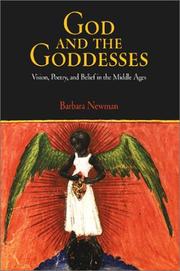
ISBN: 0812236912 Year: 2003 Volume: *48 Publisher: Philadelphia University of Pennsylvania Press
Abstract | Keywords | Export | Availability | Bookmark
 Loading...
Loading...Choose an application
- Reference Manager
- EndNote
- RefWorks (Direct export to RefWorks)
History of civilization --- Christian church history --- Literature --- anno 500-1499 --- Poetry, Medieval --- Literature, Medieval --- Goddesses in literature. --- God in literature. --- Poésie médiévale --- Littérature médiévale --- Déesses dans la littérature --- Dieu dans la littérature --- History and criticism. --- History and criticism --- Histoire et critique --- 82-1 "04/14" --- 248-055.2 --- -Goddesses in literature --- God in literature --- European poetry --- Medieval poetry --- Poëzie--Middeleeuwen --- Vrouwen en spiritualiteit --- 248-055.2 Vrouwen en spiritualiteit --- 82-1 "04/14" Poëzie--Middeleeuwen --- Poésie médiévale --- Littérature médiévale --- Déesses dans la littérature --- Dieu dans la littérature --- Goddesses in literature --- POESIE MEDIEVALE --- DIEU DANS LA LITTERATURE --- DIVINITE DANS LA LITTERATURE --- HISTOIRE ET CRITIQUE
Book
ISBN: 9026436017 9789026436017 Year: 1973 Publisher: Brugge: Orion,
Abstract | Keywords | Export | Availability | Bookmark
 Loading...
Loading...Choose an application
- Reference Manager
- EndNote
- RefWorks (Direct export to RefWorks)
Thematology --- Dutch literature --- Woestijne, van de, Karel --- God in literature. --- Dieu dans la littérature --- Woestijne, Karel Van de, --- Religion and ethics. --- Woestijne, Karel Van de --- Woestijne, Karel van de, --- Religion --- Dieu $$ Dans la littérature --- Religion $$ Dans la littérature --- Van de Woestijne, Karel, --- Critique et interprétation --- Criticism and interpretation --- #GGSB: Geestelijke lezing(rood) --- #GGSB: Literatuur (letterkunde) --- literatuurgeschiedenis --- Nederlands --- Van de Woestijne, Karel --- Van De Woestijne --- Woestijne, Karel van de --- -Religion --- Criticism and interpretation. --- Dieu dans la littérature --- De Woestijne, Karel van, --- Woestijne, Karel v.d., --- Woestijne, Carolus Petrus Eduardus Maria van de, --- Religion. --- 8393 (Van de Woestijne, K.) --- Critique et interprétation. --- Geestelijke lezing(rood) --- Literatuur (letterkunde) --- Woestijne, Karel van de, - 1878-1929 - Religion --- Dieu --- Dans la littérature --- Van De Woestijne, Karel, --- Woestijne, Karel van de, - 1878-1929
Book
ISBN: 2600002162 9782600002165 Year: 1997 Volume: 312 Publisher: Genève: Droz,
Abstract | Keywords | Export | Availability | Bookmark
 Loading...
Loading...Choose an application
- Reference Manager
- EndNote
- RefWorks (Direct export to RefWorks)
French literature --- anno 1500-1599 --- Dieu dans la littérature --- God in de literatuur --- God in literature --- French poetry --- God --- God in literature. --- Hermeneutics. --- History and criticism. --- Name. --- -God --- -God in literature --- Hermeneutics --- Interpretation, Methodology of --- Criticism --- Metaphysics --- Misotheism --- Monotheism --- Religion --- Theism --- History and criticism --- Name --- Bible --- In literature. --- Biblia --- 16th century --- French poetry - 16th century - History and criticism. --- God - Name. --- DIEUX (NOMS DE) --- LITTERATURE FRANCAISE DE LA RENAISSANCE
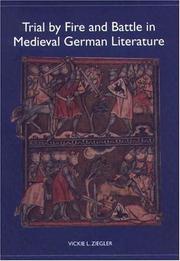
ISBN: 1571132910 9786611949242 1281949248 1571136509 9781571136503 9781571132918 Year: 2004 Volume: *29
Abstract | Keywords | Export | Availability | Bookmark
 Loading...
Loading...Choose an application
- Reference Manager
- EndNote
- RefWorks (Direct export to RefWorks)
Medieval judicial ordeals, especially trial by fire or battle, conjure up vivid pictures in the modern imagination. Yet popular perceptions of the Middle Ages leave the reader without a context in which to understand these most drastic of medieval judicial remedies. This book analyzes literary texts that provide some of the most vivid and detailed accounts of the medieval ordeal: the dramatic treason trials in late medieval Charlemagne epics. The two epics chosen - Stricker's 'Karl der Groe' and the 'Karlmeinet' - treat trial by battle as the living legal reality it was in those times, yet display very different attitudes toward feud and punishment in their respective (13th- and 14th-century) societies. Gottfried's 'Tristan' contains an ordeal by battle, of which the author approves, and an ordeal by fire, of which he does not, reflecting a common position of the intelligentsia of the time. Well after the condemnation of ordeals by the Fourth Lateran Council, the Kunigunde legend preserves the ordeal by fire much as it was portrayed in the mid-12th-century Richardis legend, while Stricker's short secular burlesque 'The Hot Iron,' written in the mid 13th century, makes sport of this formerly serious legal proceeding, reflecting its sudden abandonment as a legal proof following the council's decision. The study brings extensive background material in legal and cultural history to bear on literary texts, helping both medievalists and general readers understand the function of the ordeal in the texts as well as in the larger society for whom these works were written. Vickie L. Ziegler is professor of German and Director of the Center for Medieval Studies at the Pennsylvania State University.
German literature --- History of the law --- History of Germany and Austria --- anno 800-1199 --- anno 1200-1299 --- Godsoordeel in de literatuur --- Jugement de Dieu dans la littérature --- Ordalie dans la littérature --- Ordeal in literature --- Trial by ordeal in literature --- Ordeal in literature. --- History and criticism. --- Middle High German, 1050-1500 --- History and criticism --- Charlemagne Epics. --- Cultural History. --- Legal Proceedings. --- Literary Texts. --- Medieval Judicial Ordeals. --- Trial by Battle. --- Trial by Fire.
Book
ISBN: 9028917667 Year: 1992 Publisher: Kapellen : DNB/Pelckmans,
Abstract | Keywords | Export | Availability | Bookmark
 Loading...
Loading...Choose an application
- Reference Manager
- EndNote
- RefWorks (Direct export to RefWorks)
Poetry --- Doctrine of God (christianism) --- Engelse literatuur --- English literature --- Thematology --- anno 1800-1999 --- Dieu dans la littérature --- God in de literatuur --- God in literature --- Engelse letterkunde --- Littérature anglaise --- Theologie --- Théologie --- Academic collection --- #GGSB: Dogmatiek --- #GGSB: Jezus Christus --- #GGSB: Mythologie --- #GGSB: Natuurlijke theologie --- #gsdb3 --- C1 --- godsbeeld --- Verenigd Koninkrijk van Groot-Brittannië en Noord-Ierland [land in werelddeel Europa] (x) --- zingeving --- poëzie --- 752 --- Kerken en religie --- Poëziekritiek --- English poetry --- 19th century --- History and criticism --- 20th century --- Dogmatiek --- Jezus Christus --- Mythologie --- Natuurlijke theologie --- Theorie van proza en poëzie - Poëziekritiek
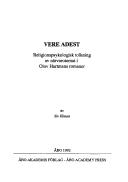
ISBN: 9529616074 9789529616077 Year: 1992 Publisher: Ȧbo: Åbo akademis förlag,
Abstract | Keywords | Export | Availability | Bookmark
 Loading...
Loading...Choose an application
- Reference Manager
- EndNote
- RefWorks (Direct export to RefWorks)
God in literature. --- Psychology, Religious --- Object relations (Psychoanalysis) --- Dieu dans la littérature --- Psychologie religieuse --- Relation d'objet (Psychanalyse) --- Hartman, Olov --- Criticism and interpretation. --- Presence of God in literature. --- Object relations (Psychoanalysis) in literature. --- 839.7 "19" HARTMAN, OLOV --- 159.9:2 --- Presence of God in literature --- Object relations (Psychoanalysis) in literature --- Zweedse literatuur--20e eeuw. Periode 1900-1999--HARTMAN, OLOV --- Godsdienstpsychologie --- Theses --- 159.9:2 Godsdienstpsychologie --- 839.7 "19" HARTMAN, OLOV Zweedse literatuur--20e eeuw. Periode 1900-1999--HARTMAN, OLOV --- Dieu dans la littérature --- Hartman, Olof
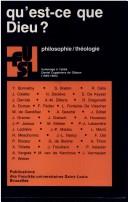
ISBN: 2802800361 2802803891 9782802800361 Year: 1985 Volume: 33 Publisher: Bruxelles: FUSL,
Abstract | Keywords | Export | Availability | Bookmark
 Loading...
Loading...Choose an application
- Reference Manager
- EndNote
- RefWorks (Direct export to RefWorks)
Par cet ouvrage, né de l’initiative des Facultés universitaires Saint-Louis, de nombreux collaborateurs et amis rendent hommage au travail et à la personnalité de l’abbé Daniel Coppieters de Gibson. Leurs textes rassemblés autour de la question : Qu'est-ce que Dieu ? font écho à sa préoccupation majeure en théologie et en philosophie, comme en littérature et en sciences humaines. Au-delà du mémorial, ils attestent, chacun à sa manière, du bien-fondé de cette question impérieuse, quoique impertinente, et de l’attente d’une réponse qui ne peut qu’emprunter des voies obliques.
Natural theology --- Doctrine of God (christianism) --- Coppieters de Gibson, D. --- Filosofie --- Huldeboeken --- Mélanges --- Philosophie --- Theologie --- Théologie --- God --- God in literature --- Religion --- Dieu --- Dieu dans la littérature --- Philosophy --- Coppieters de Gibson, Daniel, --- God (Christianity) --- 23 <082> --- 211 --- #GOSA:III.Alg.M --- #GROL:SEMI-23<082> --- #gsdb3 --- #gsdbf --- #GGSB: Dogmatiek --- #GGSB: Godsleer --- 231 --- Dogmatiek. Systematische theologie. Theologie:--in strikte zin--Feestbundels. Festschriften --- God. Opperwezen. Oneindige: deïsme; theïsme; atheïsme --- God. De Deo uno et trino:--dogmatisch --- Festschrift - Libri Amicorum --- 231 God. De Deo uno et trino:--dogmatisch --- Dieu dans la littérature --- Christianity --- Trinity --- De Gibson, Daniel Coppieters, --- Gibson, Daniel Coppieters de, --- Coppieters, Daniel, --- Dogmatiek --- Godsleer --- God in literature. --- Philosophy. --- Religion - Philosophy --- Coppieters de Gibson, Daniel, - 1929-1983 --- évangile --- philosophie --- abbé --- Bible --- littérature --- christianisme --- sacré --- théologie --- religion --- God.
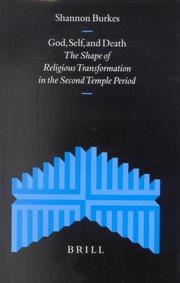
ISBN: 9004129545 9004493808 9789004129542 9789004493803 Year: 2003 Volume: 79 Publisher: Leiden: Brill,
Abstract | Keywords | Export | Availability | Bookmark
 Loading...
Loading...Choose an application
- Reference Manager
- EndNote
- RefWorks (Direct export to RefWorks)
This volume considers the emerging Jewish interest in an afterlife during the second temple period in relation to developing views of the deity and the self. In some circles God is understood as increasingly distant from the human sphere, and so justice must occur in another world or after death; at the same time, more autonomous constructions of the self in response to community breakdown suggest that reward and punishment come not only collectively, but also on the individual level in a post-mortem realm. The book traces the interconnections between these themes in Job and Ecclesiastes, Ben Sira and Daniel, then Wisdom of Solomon and 4 Ezra, crossing genre boundaries in an attempt to offer a more encompassing historical investigation.
Bereavement in literature --- Death in literature --- Dieu dans la littérature --- Dood in de literatuur --- God in de literatuur --- God in literature --- Ik in de literatuur --- Moi dans la littérature --- Mort dans la littérature --- Self in literature --- Sterfte in de literatuur --- Judaism --- History --- Bible --- Criticism, interpretation, etc --- 221.08*01 --- -Jews --- Religions --- Semites --- Jews --- Theologie van het Oude Testament: God--(Godsleer) --- -Religion --- Religion --- -Theologie van het Oude Testament: God--(Godsleer) --- -221.08*01 --- 221.08*01 Theologie van het Oude Testament: God--(Godsleer) --- Soi dans la littérature --- Zelf in de literatuur --- Hellenistic Judaism --- Judaism, Hellenistic --- Bible. --- Agiografi --- Hagiographa --- Kethubim --- Ketuvim --- Criticism, interpretation, etc. --- Bible. O.T. Hagiographa --- Post-exilic period, 586 B.C.-210 A.D.
Book
ISSN: 02445689 ISBN: 9782356680297 2356680292 Year: 2012 Volume: 16 48 Publisher: Lyon: Maison de l'Orient et de la Méditerranée - Jean Pouilloux,
Abstract | Keywords | Export | Availability | Bookmark
 Loading...
Loading...Choose an application
- Reference Manager
- EndNote
- RefWorks (Direct export to RefWorks)
Dans la littérature antique qui s'apparente au genre romanesque et dans les oeuvres plus proprement romanesques qui la prolongent aux époques byzantine puis moderne, la relation des hommes aux dieux occupe nécessairement une place importante : les héros de ces oeuvres appartiennent à des sociétés qui étaient fortement religieuses, vivaient naturellement dans la familiarité du divin et des cultes qui lui étaient liés ; quant aux auteurs de ces oeuvres, et aux lecteurs auxquels ils s'adressaient, leur mentalité et leurs catégories intellectuelles étaient tout imprégnées du religieux, que l'on prenne le mot au sens fort de croyance ou dans le sens plus large de culture commune partagée. Ce sont ces liens entre les hommes et les dieux que le Ve colloque sur la littérature romanesque antique et ses prolongements, organisé à Tours en octobre 2009, s'était fixé comme thème d'étude, sur un corpus assez large puisqu'il a conduit de l'époque hellénistique (avec Évhémère) jusqu'au XIXe siècle (avec les romans grecs de M. Perdikaris, P. Soutsos, A. Papadiamantis ou E. Rhoïdis), en passant par les époques impériale (avec les Métamorphoses d'Apulée ou les cinq « grands » romans grecs antiques de Longus, Chariton, Achille Tatius, Xénophon d'Éphèse ou Héliodore) et byzantine (avec Rhodanthe et Dosiclès de Prodrome, Drosilla et Chariclès d'Eugénianos, Hysminé et Hysminias de Macrembolite, Aristandre et Kallithéa de Manassès), sans oublier des textes d'inspiration chrétienne ou juive (les Actes d'André ou Joseph et Aséneth ). Si les rapports entre les dieux et les hommes ont le plus souvent été compris et étudiés, lors de ce colloque, comme une forme ou une métaphore de la relation entre l'auteur et le lecteur, si l'on s'est attaché à faire ressortir le rôle structurant de la religion ou des divinités dans la matière romanesque ou à mettre en lumière la fonction métalittéraire parfois allouée par les auteurs à la religion ou à ses représentants, une approche plus classique, voire historique, a également été adoptée lorsque ont été scrutés le message spirituel ou philosophique de l'oeuvre considérée, et ses éventuelles relations avec des problèmes contemporains de sa rédaction. Deux principaux angles d'approche ont ainsi été adoptés ; le religieux en tant que matériau utilisé pour l'écriture du roman ou comme mode, voire comme « otentialité d'écriture » (c'est le titre de la première partie de cet ouvrage) ; et le religieux en tant qu'objet du discours ou fondement de l'univers romanesque, autrement dit le « fonds religieux » (c'est le titre de la seconde partie).
Classical literature --- Literature, Medieval --- Religion and literature. --- God in literature. --- Gods in literature. --- Littérature ancienne --- Littérature médiévale --- Religion et littérature --- Dieu dans la littérature --- Dieux dans la littérature --- Themes, motives. --- Thèmes, motifs --- Gods in literature --- God in literature --- Religion and literature --- Greek literature --- History and criticism --- Greek literature. --- Grekisk litteratur --- Gud i litteraturen. --- Gudar i litteraturen. --- Religion och litteratur. --- Historia. --- Littérature ancienne --- Littérature médiévale --- Religion et littérature --- Dieu dans la littérature --- Dieux dans la littérature --- Thèmes, motifs --- Gods in literature - Congresses --- God in literature - Congresses --- Religion and literature - Congresses --- Greek literature - History and criticism - Congresses --- Dieu --- Dieux --- Littérature grecque --- Dans la littérature --- Histoire et critique
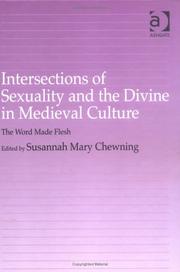
ISBN: 9780754640653 9781351926362 1351926365 0754640655 9781315251875 9781351926348 9781138266537 1138266531 1315251876 1351926357 9781351926355 Year: 2005 Publisher: Aldershot Ashgate
Abstract | Keywords | Export | Availability | Bookmark
 Loading...
Loading...Choose an application
- Reference Manager
- EndNote
- RefWorks (Direct export to RefWorks)
As distinct from the many recent collections and studies of medieval literature and culture that have focused on gender and sexuality as their major themes, this collection considers and serves to re-think and re-situate religion and sexuality together. Including 'traditional' works such as Chaucer and the Pearl-poet, as well as less well known and studied texts - such as alchemical texts and the Wohunge group - the contributors here focus on the meeting point of these two often-examined concepts. They seek an understanding of where sex and religion distinguish themselves from one another, and where they do not. This volume locates the Divine and the Erotic within the continuum of experience and devotion that characterize the paradox of the medieval world. Not merely original in their approaches, these authors seek a new vision of how these two inter-connected themes, - sexuality and the Divine - meet, connect, distinguish themselves, and merge within medieval life, language, and literature.
Religious studies --- Old English literature --- Christianity and literature --- Christian literature, English (Middle) --- Civilization, Medieval, in literature --- English literature --- God in literature --- Holy, The, in literature --- Religion in literature --- Sex in literature --- Sex --- 241.64 --- 241.64 Theologische ethiek: seksuele ethiek --- Theologische ethiek: seksuele ethiek --- Gender (Sex) --- Human beings --- Human sexuality --- Sex (Gender) --- Sexual behavior --- Sexual practices --- Sexuality --- Sexology --- Religion in drama --- Religion in poetry --- History --- History and criticism --- Religious aspects --- Christianity --- History of doctrines --- Religion in literature. --- History and criticism. --- LITTERATURE ANGLAISE --- RELIGION DANS LA LITTERATURE --- SEXE --- LITTERATURE CHRETIENNE ANGLAISE --- CHRISTIANISME ET LITTERATURE --- CIVILISATION MEDIEVALE DANS LA LITTERATURE --- SACRE (LE) DANS LA LITTERATURE --- DIEU DANS LA LITTERATURE --- SEXUALITE --- 1100-1500 (MOYEN-ANGLAIS) --- HISTOIRE ET CRITIQUE --- ASPECT RELIGIEUX --- CHRISTIANISME --- GRANDE-BRETAGNE --- JUSQUE 1500 --- DANS LA LITTERATURE
| Listing 1 - 10 of 11 | << page >> |
Sort by
|

 Search
Search Feedback
Feedback About UniCat
About UniCat  Help
Help News
News